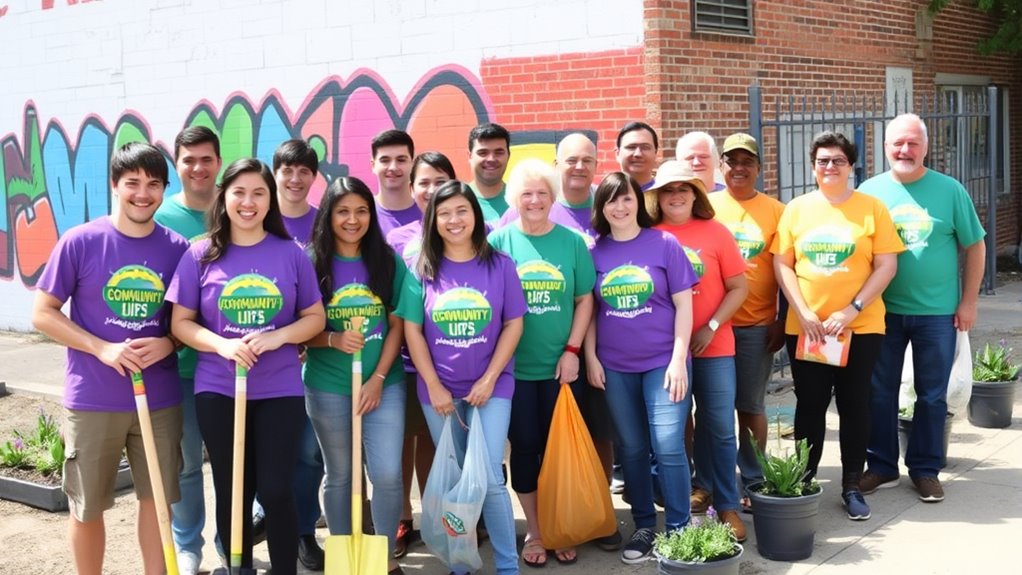Volunteering is a meaningful way to give back to your community while benefiting personally. By helping others, you can develop new skills, boost your confidence, and improve your mental health. It also helps create stronger bonds with like-minded individuals, fostering a sense of belonging and purpose. Small acts can lead to big changes, making neighborhoods safer, healthier, and more inclusive. To discover how many ways volunteering can transform your life and your community, keep exploring further.
Key Takeaways
- Volunteering allows individuals to give back, support community needs, and foster social cohesion.
- It promotes personal growth, skill development, and boosts mental health and self-esteem.
- Volunteering creates positive community impacts, improving local services and supporting vulnerable groups.
- It helps build social connections, fostering a sense of belonging and community resilience.
- Small acts of volunteering contribute to larger societal change and strengthen neighborhood bonds.

Have you ever wondered how volunteering can transform not just your community but also your own life? When you step up to help others, you’re driven by more than just a sense of duty—you’re fueled by volunteer motivation. That motivation can stem from various sources: a desire to give back, personal growth, or even a hope to make a tangible difference. Recognizing what drives you helps sustain your efforts and keeps your commitment strong. When you understand your motivation, your actions become more meaningful, and your impact grows more powerful. Volunteering isn’t just about doing good; it’s about creating a ripple effect that touches many lives, including your own. As you dedicate your time and skills, you directly influence your community’s well-being and resilience. Your efforts can improve local services, support vulnerable populations, or even help shape a more inclusive environment. This community impact is often the most rewarding aspect of volunteering—it’s a clear reminder that your actions matter. When you see the difference you make, it reinforces your motivation and encourages you to keep going. Whether you’re helping out at a food bank, mentoring youth, or participating in neighborhood cleanups, every contribution adds up. It’s easy to underestimate the power of small acts, but collectively, they can lead to significant change. The community feels the effects of your commitment through safer streets, healthier residents, and stronger social bonds. You begin to notice how your involvement fosters connections with others who share your passion, creating a sense of belonging and purpose. These relationships often become the backbone of sustainable community growth. Plus, volunteering offers personal benefits that are sometimes overlooked. It can boost your confidence, develop new skills, and even improve your mental health. The act of giving back provides a sense of fulfillment that’s hard to find elsewhere. Engaging in volunteering activities can also enhance your cognitive function and memory retention, making you more alert and focused in other areas of life. As you become more engaged, you’ll realize that your volunteer motivation feeds into a cycle of positive reinforcement—your efforts inspire others, amplifying the community impact. In turn, your own life becomes richer and more connected. So, when you choose to volunteer, remember that your involvement is about more than just giving your time; it’s about making a meaningful difference that resonates far beyond your immediate actions. Every moment you dedicate helps build stronger neighborhoods, healthier communities, and a more compassionate world. And in doing so, you often find that the greatest reward is the personal growth and sense of purpose that come from truly giving back.

Volunteer Hours Tracker Log Book: Track Every Contribution. Ideal for Volunteers, Coordinators, and Teams
As an affiliate, we earn on qualifying purchases.
As an affiliate, we earn on qualifying purchases.
Frequently Asked Questions
How Can I Find Local Volunteering Opportunities Suited to My Skills?
You can find local volunteering opportunities suited to your skills by exploring community events and organizations online or in person. Use skill matching tools on volunteer websites like VolunteerMatch or Idealist, which connect your abilities with suitable roles. Attend local community events to network and discover opportunities firsthand. By actively searching and engaging with these resources, you’ll find meaningful ways to give back that align with your talents.
What Are the Benefits of Volunteering for Mental Health?
Did you know that volunteering can boost your mental well-being by reducing stress and depression? When you volunteer, you build emotional resilience, which helps you handle life’s challenges better. You gain a sense of purpose, foster social connections, and experience happiness from helping others. These activities encourage positive emotions, improve your outlook, and support overall mental health, making volunteering a powerful way to enhance your emotional resilience and mental well-being.
Can Volunteering Help Me Advance My Career?
Yes, volunteering can help you advance your career by expanding your professional network and developing new skills. You’ll meet people in your industry or related fields, opening doors to opportunities. Plus, volunteering allows you to gain experience, showcase your dedication, and learn valuable skills like teamwork, leadership, and communication. These benefits make you more attractive to potential employers and can accelerate your career growth.
How Do I Choose the Right Volunteer Organization?
To select the appropriate volunteer organization, start by considering your passions and skills. Use volunteer matching tools to find opportunities aligned with your interests, which boosts community engagement and keeps you motivated. Research organizations’ missions and values to make certain they resonate with you. Talk to current volunteers to gain insights. This way, you’ll find a fulfilling role where you can make a meaningful impact while advancing your personal growth.
What Should I Do if I Encounter Challenges While Volunteering?
Did you know that 60% of volunteers experience burnout at some point? If you face challenges, don’t ignore your feelings. Take breaks to deal with burnout, and seek support from fellow volunteers or supervisors. Communicate openly about your struggles, and ask for help when needed. Remember, it’s okay to step back temporarily—your well-being is essential for making a lasting impact in your community.

Walking With Care: Stories and Tools for Community Health Workers
As an affiliate, we earn on qualifying purchases.
As an affiliate, we earn on qualifying purchases.
Conclusion
Volunteering is like planting seeds in your community’s garden—you nurture growth and watch it flourish. Every moment you give makes a difference, creating ripples that reach far beyond what you see. When you give back, you not only help others, but you also find a sense of purpose and connection. So, step in and get involved—your time and kindness can be the spark that lights up someone’s life today.

Perfect Volunteering Keychain, I Don't Need Therapy, Gifts For Friends, Present From Friends, Black Keyring For Volunteering, Hobby supplies, Hobby equipment, Hobby tools, Hobby kits, Gift for
Durable and Long-Lasting: Our Volunteering Keychain is crafted from high-quality stainless steel, ensuring that it is durable enough…
As an affiliate, we earn on qualifying purchases.
As an affiliate, we earn on qualifying purchases.

Metal Charity Donation Box – Secure Steel Collection Box with Front Slot, Easy Wall Mount, 8.5×6.5×4" Gray
Secure Charity donation and Suggestion box
As an affiliate, we earn on qualifying purchases.
As an affiliate, we earn on qualifying purchases.









